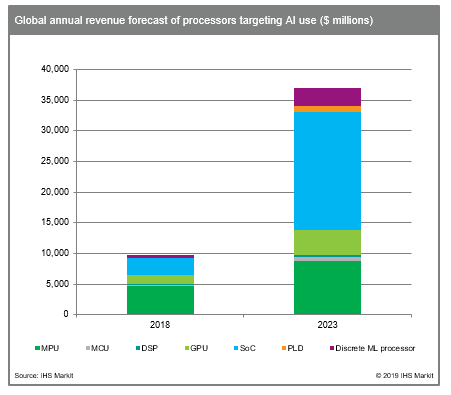Fueling much of today’s ongoing transformative technologies are
tiny but remarkably powerful bits of complex circuitry known as
system-on-chip (SoC). And while SoCs are helping drive growth in
the processor industry today, a key area of advancement in SoCs is
their increasing integration of artificial intelligence (AI)
capabilities.
Containing processors, memory, external communication
interfaces, and other electronic components, SoCs pack sizable
computing power into a small silicon chip no bigger than a coin.
But these miniaturized chip solutions are especially valuable: In
mobile phones and other battery-operated but highly intelligent
devices where space for circuitry is at a premium, SoCs integrate
the various components needed by smartphones and similar mobile
devices to carry out all the complex tasks required by mobile
computing and communications—all while consuming much less
power and taking up less room than multichip designs with
equivalent functionality.
System-on-chip solutions have been available and in use for some
time—prominent examples include Apple’s A12 Bionic series for
the iPhone and iPad; Samsung’s Exynos line for its Galaxy-series
smartphones; and Qualcomm’s Snapdragon SoC for smartphone brands
like LG, HTC, and Google.
However, what will propel the SoC industry in its next big leap
forward will be artificial intelligence, as AI-related demand spurs
the creation of new technologies requiring more powerful chip
solutions. This is true because SoCs will need immense computing
power to deploy the complex algorithms characteristic of AI to
machines, enabling them to structure high-level abstractions,
process multiple layers of information, and perform myriad other
cognitive functions normally associated with the human mind.
Chip manufacturers hoping to offer AI know-how and competencies
will need to rely on AI-equipped SoCs and related hardware as a
differentiating factor from their competition. Through efficient AI
inference on the SoC, systems can then process the large quantities
of data accompanying AI workloads, find meaningful patterns during
data analysis, and extrapolate critical problem-solving
insights.
Huge market potential ahead for SoCs
The SoC industry today is valued at $90 billion, but SoCs
featuring AI functionality designed into the chip make up slightly
less than 3% of the current market. Over the next couple of years,
IHS Markit expects that virtually every major semiconductor
manufacturer producing processors will want to carry a product line
showcasing AI as a key feature.
Within the market for processors targeting AI application and
use, IHS Markit projects global revenue in that space to rise to
$37.1 billion by 2023, up from $9.9 billion in 2018, as the chart
below shows.

The anticipated uptake of AI-bearing SoCs will translate into
robust growth for the miniature solutions. In the next five years,
global SoC industry revenue is expected to approximately double
each year so that by 2023, nearly half of all SoC solutions will
contain built-in AI capabilities. In turn, these solutions will
harness the power of AI to enable innovation and advance
development further in next-generation technologies, such as facial
recognition, advanced driver assistance systems in self-driving
cars, and greater security features in everyday devices like
smartphones and their cameras.
All told, SoCs with AI will create demand for new technologies
and unlock fresh market opportunities, creating a virtuous circle
that helps lift overall SoC industry revenue.
And the benefits don’t stop there, as SoC market gains from AI
are reciprocated in symbiotic fashion. Just as AI will boost SoC
prospects, SoC solutions bearing AI capabilities will be a key
factor in the next five years to drive growth and innovation in
artificial intelligence.
Tom Hackenberg is associate director and senior principal
analyst for processors at IHS Markit
Posted 7 June 2019